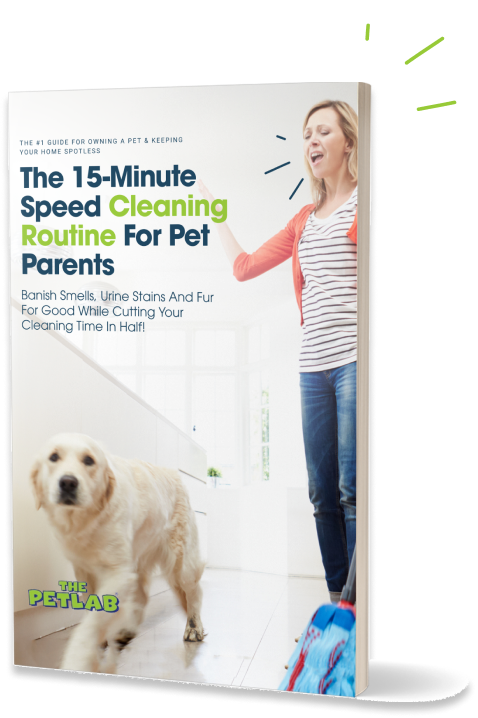Your first thought reading this blog title was probably, “Can it?!” 😲
Followed by, “It’s just urine. It won’t kill me.” 😑
You’re right. In all likelihood–under normal circumstances and in a healthy population–it won’t. But that doesn’t mean pee is harmless. In fact, regular and prolonged exposure to urine odours can cause some grave health problems. Mainly because of what’s in your pet’s pee.
Why does dog urine smell so bad?
We all know dog pee stinks. What we don’t always know is why.
It basically comes down to chemical composition. Your dog’s wee is 95% water and 5% water-soluble organic matter and ions. Among them is ammonia—a colourless but irritating gas that gives urine its distinctively pungent odour. That’s what can make you sick.
Why be concerned about ammonia?
Ammonia may not seem all that scary. After all, it’s everywhere: Urine, cleaning products, and fertilizer. You’re exposed to it every single day—often without you even knowing it!
But it’s also an “atmospheric contaminant” and “biohazard waste”. Big words that mean: Ammonia is toxic. ☠️
This is because—whether you breathe it in, swallow it, or have skin contact—ammonia reacts with water in the body to produce ammonium hydroxide. Warning: This is highly corrosive to tissues upon contact.
Even in small quantities (as with dog pee), ammonia fumes can irritate the lungs and cause breathing problems. This can happen if you suffer from a condition like asthma.
Inhaling large quantities, on the other hand, can make airways feel like they’re on fire and, quite literally, suffocate you. Translation: Contact with ammonia can be deadly.
Health effects of breathing ammonia fumes
We’ll start with the impact of small quantities of ammonia fumes because that’s what you’re most likely to encounter in your day-to-day pet parenting affairs. Like, for instance, during the puppy potty training period.
With low-concentration exposure, you might experience:
- Lightheadedness
- Coughing
- Nose, throat, eye, and skin irritation
These symptoms are not the end of the world. But they are not exactly pleasant either.
What about high concentrations of ammonia?
You’re unlikely to experience that from dog urine alone. (Unless you never, ever clean up behind your dog. 🤨)
But if you consider other sources of ammonia in the home (detergents, glass cleaners, floor polishing waxes), there’s still a significant risk of exposure—especially with poor ventilation. Case in point: The improper handling of cleaning products and accidental spills.
In that case, you might experience:
- Burning of the eyes, nose, throat, and lungs
- Airway damage
- Shortness of breath
- Suffocation
- Death
Yeah, not good.
In short, repeated and extended exposure to ammonia fumes can trigger or exacerbate a wide range of conditions. These include:
- Allergies
- Pneumonia
- Asthma
- Chronic obstructive pulmonary disease (COPD)
How to minimise exposure at home
There’s no going back once you’re conscious that pet pee odour is unhealthy. (When you know, you know. 😬) But don’t fret just yet because there are ways to limit exposure to toxic fumes.
#1 Prevent doggy dehydration
Concentrated pee is way more potent than regular pee. It's also dangerously unhealthy for your pup.
ℹ️ A dehydrated dog’s pee is bright yellow, amber-, or honey-coloured. It should ideally be transparent yellow or almost colourless.
Solution: Give your pet enough water throughout the day for less smelly wees.
#2 Clean messes up quickly
Remember the chemical composition of pee? When the water evaporates, what's left is an undiluted solution of sharp-smelling ammonia. Boy, does it stink to high heaven!
Solution: Don’t let “accidents” dry up before you do something about it. Foul odours become harder to resolve once urine seeps deep into floorboards, carpets, and furniture.
#3 Use enzymatic products
Unlike enzyme-based cleaning products, regular cleaning solutions don’t get to the root of odour problems. Meaning you are only temporarily masking pet-related odours rather than eliminating them.
Solution: Choose enzymatic cleaning products so you don’t have to worry about:
- Creating more toxic fumes.
- Being extra careful not to mix ammonia and bleach. (This produces a poisonous gas that can kill you.)
#4 Ensure proper ventilation
Without aeration, nasty odours and air impurities build up.
Solution: Open your windows and let fresh air in every day!
#5 Get a few houseplants
Indoor plants help neutralise odours and filter airborne pollutants.
Solution: Improve the air quality in your home with these pet-friendly houseplants.
Stay safe, guys. See you next time!


